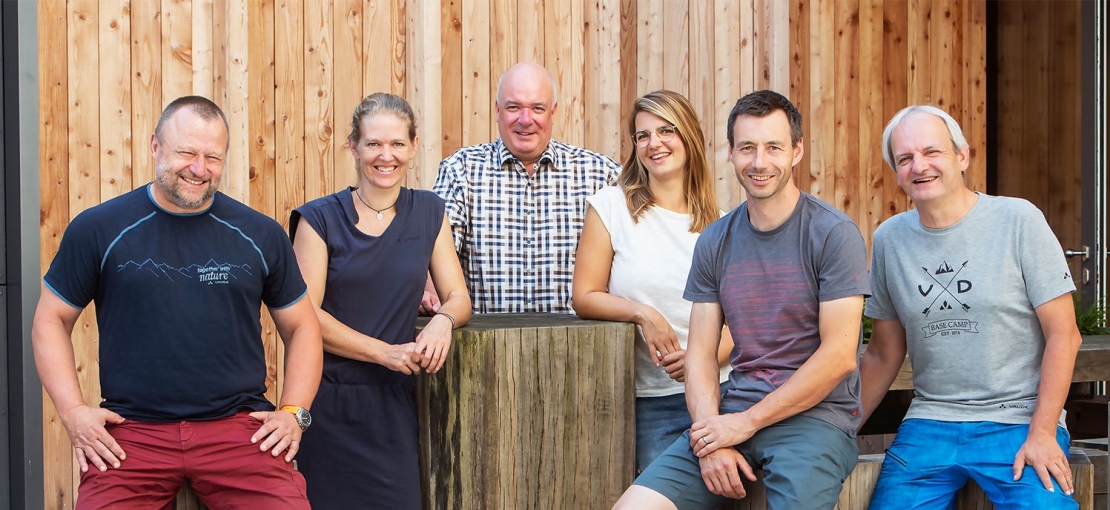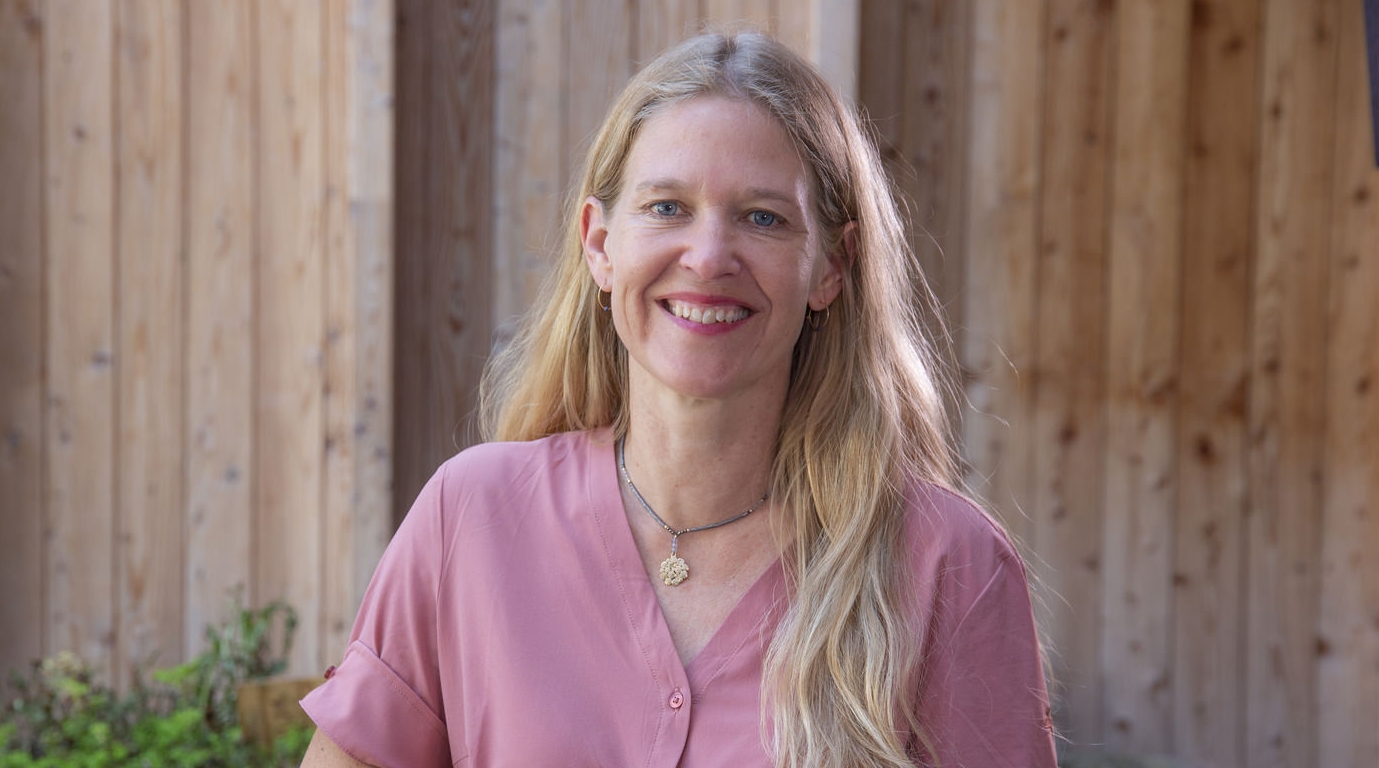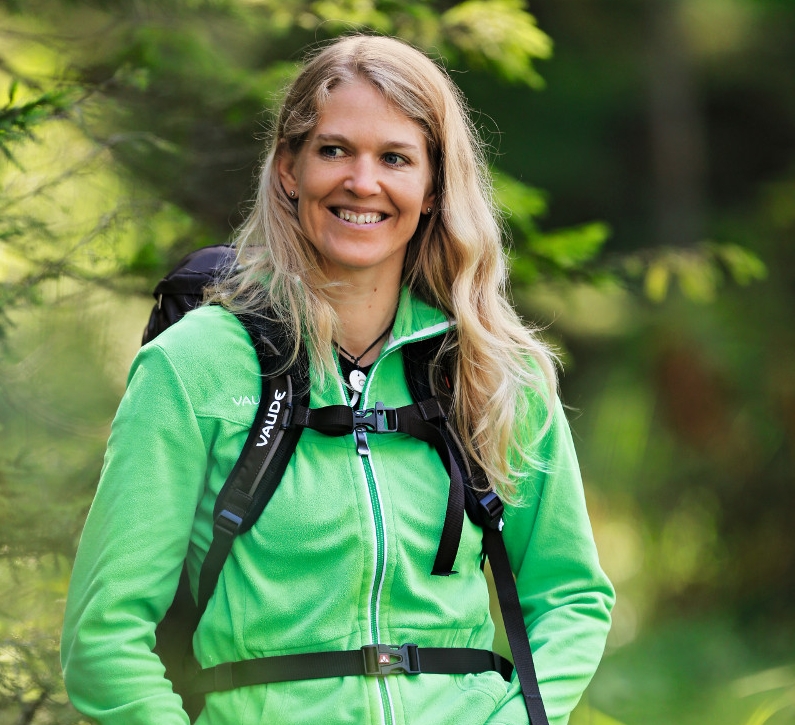
We get involved and take a position
Working together toward greater sustainability

»Corporate responsibility is something that I feel really passionate about. Together with my colleagues, I am also active on a political level.«
Forms of political participation at VAUDE
The management and the CSR team work together to discuss and address obstacles and opportunities as well as issues brought to our attention by third parties. We consider which avenues to use and how we can/must make the issues public if we want to achieve change. We do this because we firmly believe that we can only achieve truly sustainable solutions by working together and that it is important to be an influencer when and where appropriate.
We are active on many levels making a political commitment to sustainability. This includes contact with politicians as well as active participation in industry associations and initiatives.
Taking a position on socio-political issues
In terms of the global economy, 2021 continued to be dominated by the Corona pandemic. It is important to us to make a strong socio-political case for ensuring that the climate crisis and the demand for responsible economic activity doesn’t get pushed into the background, but that framework conditions and solutions continue to be created at both the political and economic level. We were particularly motivated by the realization that our sustainable management helped us to master the Corona crisis resiliently and successfully. Sustainable business practices that proactively address challenges make us strong in crises and fit for the future! We are committed to ensuring that companies proactively use the crisis to align themselves sustainably with a view to the future.
In 2021, a German supply chain law was launched and a draft law for human rights and environmental due diligence in global supply chains was also presented at the EU level in early 2022. We are publicly positioning ourselves in favor of supply chain laws and in support for the assumption of responsibility in global supply chains. A lack of legal foundation of minimum social and ecological standards not only supports the exploitation of people and nature, it also creates competitive disadvantages for companies like VAUDE, which have already been working for fair and environmentally friendly production conditions worldwide for years.
Since Russia's invasion of Ukraine in February 2022, we in Europe experienced a turning point in history that poses enormous challenges to the defense of our democratic values and the right of sovereign states to peace, freedom and democracy. The war, its dependencies and its consequences also pose a threat to peace and economic stability in our country. It is becoming apparent, for example, that a sustainable energy policy and a resource-dependent economy are also issues of independence and peacekeeping. Just as in times of the pandemic, we are finding that sustainable economic activity makes holistic sense and is important.
We see recognize our points of contact and our position on socio-political issues in the following five areas:
Environmental and species protection, climate change and the energy system transformation
Economic activity – the manufacturing of products and services – always goes hand in hand with the consumption of resources. The resulting negative environmental impact such as emissions often are not counted in our current economic system for the company responsible for the pollution and thus have no effect on market price. Instead, the general public has to pay the price. In our opinion, this isn’t right.
Corporate responsibility in the supply chain
Our stance is that companies have complete responsibility for the impact of their business activities. We therefore invest both human and financial resources in the development and manufacture of environmentally friendly products, for example, through the use of resource-conserving materials, environmental management training in the supply chain, climate balancing and environmentally friendly energy sources. In doing so, we voluntarily go far beyond legal requirements. But this also means that because of our level of commitment, we have higher costs that our competition. This is why we are in favor of more stringent statutory requirements and more government incentives for operational climate and environmental protection. Examples include a reasonable CO2 tax, the supply chain law, binding requirements in chemicals legislation or for sustainability reporting, as well as tax breaks and easier access to financial resources for sustainable businesses.
Climate protection through reducing CO2 emissions
We are in favor of a rapid transition to clean, environmentally friendly and safe energy so that we can limit the impact of climate change on people, the environment and the economy, and therefore on our business to a manageable level. In addition to climate protection, this also involves minimizing dependence on fossil energy supplies and ensuring energy security. This includes the rapid development of renewable energy, investment in energy efficiency, energy conservation and energy storage, as well as in the modernization of current networks. In our opinion, this is a prerequisite for the future viability of Germany as a business location.
We support the goals of the international Framework Convention on Climate Change and would like to see the German Federal Government play an active, pioneering role in its implementation in Germany. We support global climate protection movements such as Fridays for Future and Scientists for Future and are a supporter of the corresponding Entrepreneurs for Future initiative. We have also joined the Science-Based Targets (SBT) initiative and set science-based climate targets for systematically reducing CO2 emissions that are in line with the requirements of the Paris Agreement to limit global warming to 1.5 °C or well below 2 °C.
Maintaining biodiversity
The protection of nature and species is a heartfelt concern for us. In view of the loss of biodiversity, we see an urgent need to change our mindsets and take action. We welcome demands such as those for legal regulations to reduce the use of pesticides and insecticides etc., as well as measures to preserve protected areas and increase biodiversity in our flora and fauna.
Überschrift
We attach great importance to the environmentally friendly practice of mountain and bike sports activities in nature. As a partner of the German Alpine Association (DAV), we support its objectives for the protection and sustainable development of the Alpine region as well as for environmentally friendly mountain sports.
Recommended reading:
Economic activity for the common good
We believe that business activity involves responsibility for actively assuming responsibility for the social and environmental impacts of one's own actions and contributing to the public good. Entrepreneurial success should be measured not only in terms of financial profits, but also in terms of its contribution to the environment and society.
Our current economic system, however, rates companies primarily by their financial success. The result is that, generally speaking, companies are oriented toward short-term profit maximization. In many cases, this is at the expense of society and the environment. In view of the extent of global environmental destruction and exploitation, we recognize an acute market failure that requires political action. We therefore advocate for minimum social and ecological standards the supply chains. We also advocate that corporate action should be measured holistically, such as on the basis of economic, ecologic and social aspects. Such an approach will contribute to a long-term, stable and fair economic system in which human rights and the environment are protected.
We at VAUDE are closely examining the issue of business activity geared toward the public good. The Economy for the Common Good is an exciting and meaningful approach. We are a pioneer company in the Economy for the Common Good with an audited Common Good Balance Sheet.
You’ll find the VAUDE Economy for the Common Good Balance Sheet here
Immigration, asylum policies and integration
Our global economic system is too often based on social exploitation, injustice and environmental destruction. As a result, we as an economy are also contributing to the causes of immigration, such as social inequality and the effects of the climate crisis, which contribute to more people being forced to leave their homes than ever before. A new addition in 2022 is the great wave of refugees in Europe as a direct result of the Ukraine war and Russia's violations of international law.
We are actively promoting refugee integration in the labor market in order to effectively address our responsibilities as an employer. Populist, nationalist and extreme right-wing currents that are serving to prevent this and that respond to complex problems with oversimplified answers are worrying to us. We want to demonstrate that the integration of refugees can be successful for everyone in our society and contribute toward maintaining social peace in our community. Read more here
In our experience, access to the labor market is an essential element for successful integration. Employment not only secures the income of refugees, it also creates a regular daily routine, provides opportunities to establish social contacts and affords validation.
Politically persecuted people, such as those from countries experiencing civil war, have a right to asylum in Germany. We are therefore advocating for well-structured, fair asylum procedures for people who have fled to Germany because their lives and health are endangered in their home countries – one that makes rapid integration into the labor market, as well as access to education and health care possible. Asylum seekers must not be expelled back to countries where they will face discrimination or social misery.
We call for refugees who have already been successfully integrated into the labor market to be given prospects to stay in the country. Together with many other companies, including as a founding member of the entrepreneurial initiative “Bleiberecht durch Arbeit” (Right to stay through work), we are committed to these demands at the state and federal policy level. As an employer of refugees, we need transparent and non-bureaucratic legal certainty when hiring these refugees. The deportation of employees not only creates great anxiety and uncertainty among those directly affected and their colleagues, it also entails economic risks for us as an employer when these employees are deported.
Diversity, gender equality, women quotas
We are convinced that diverse teams make better decisions and that innovation is most strongly unleashed where gender differences no longer play a role. We therefore focus on diversity regardless of gender, age or nationality.
In the years when Antje von Dewitz took over leadership of the company, we specifically addressed women and encouraged them to apply for management positions. Many rejected the idea at first because they had the feeling that they wouldn’t be able to balance their professional and private lives in a management position or they were wary of the harsh tone of a male-dominated management culture. Therefore, we gradually implemented a variety of changes in our operational environment and modified our corporate culture to attract women to management positions. With success: since 2016, over 40 percent of our managers have been women.
The intensive and continuous establishment and maintenance of our family-friendly, inclusive and equal opportunity corporate culture is also now one of our company's strongest success factors. This is why we support initiatives and political demands for equal opportunities for women in business.

»A legal quota for women in my view is an important tool for launching a cultural change in the industry because there are still companies that do not do justice to the scope of the necessary changes: a gender balance in all levels of the company not only ensures sustainability for the individual company, but in my opinion, is also a success factor for Germany as a location of business.«
Our commitment to diversity at VAUDE
| GRI: | 415-1 |




